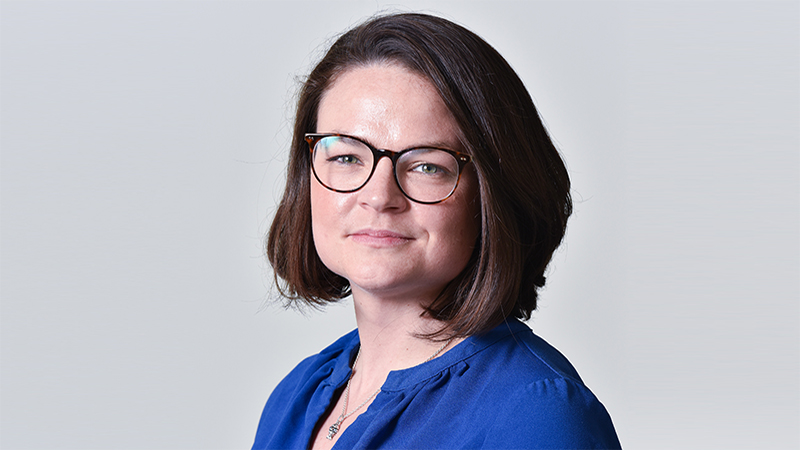“When I was younger, I was always told I was bossy,” JM Finn’s Laura Langton tells Portfolio Adviser. “I do see myself as a bit of a control freak. My boss Andrew tells me that I am not, however, and that I just like tasks to be done well and to be done correctly. That is why he hired me.
“He doesn’t roll his eyes and think to himself, ‘here we go again’, or see me as demanding. And that is how it should be – being organised and diligent should be seen as a positive.”
At the age of 29, Langton has already achieved an esteemed career in financial services, currently assisting with the management of £400m of client’s assets at wealth management firm JM Finn. Alongside her day-to-day role as an investment manager, which involves both engaging with clients and portfolio construction, Langton manages JM Finn’s US collectives ‘preferred’ list. She also sits on the young investment managers’ forum, as well as the firm’s Diversity & Inclusion committee.
“The joy of the job is that there is so much to get involved in. If you ever meet somebody who says they are a bored investment manager, they are definitely doing it wrong.”
See also: CFA targets ‘cultural change’ as it launches UK diversity code
And, to make absolutely certain she does not leave room for an iota of boredom, Langton is preparing to row across the Atlantic next month to raise money for Macmillan Cancer, the Outward Bound Trust and Prostate Cymru.
“[My manager] Andrew does not see the fact I am taking two months off for the row as a negative, he thinks it’s a great thing for our clients to see me do. Where there are other strings to our bow as a team, we can discuss these with our clients because we have long-standing relationships with them.”
A road less travelled
Langton’s path into the industry was not a straightforward one. But not because she accidentally fell into investing and grew to embrace it, which is the rhetoric for some with less conventional backgrounds – she knew, after an informal internship at BlackRock, that she wanted a client-facing role in investment.
“I had absolutely no idea how to do it. As a history undergraduate, I couldn’t work out what job title I needed to search for. I applied to several different places but it didn’t work out because I didn’t have a finance degree and I didn’t have a huge amount of experience in that area.”
However, a chance meeting with JM Finn’s then-head of investment management led to her leaving her role as a business analyst at the Daily Mail (“I just wanted to get my foot in the door of the corporate world in the City somehow”) and becoming her personal assistant, on a nine-month maternity cover contract.
“I was 22 at the time so decided to go for it. Then, before my contract ended, JM Finn set up a graduate programme. They had wanted to do this for some time but it is always a big risk launching a brand new programme with external candidates for the first cohort.
“But there was a pool of three of us at the business who were looking to become trainee investment managers, so we jumped into the pilot programme.”
Becoming an advocate
Langton’s passion for becoming a diversity advocate stemmed from a lunch break during an investor’s day, which she attended with a colleague while she was still on the training programme.
“As we were milling around, we realised we were the only two women under 50 there. Fiona Hathorn, the CEO of Women on Boards, was there and spotted us – she asked us how it made us feel.
“The answer was that I felt a little bit sad that there weren’t other up-and-coming female investors attending these sorts of conferences. That was probably the turning point for me.”
See also: A step in the right direction’: FCA bids to boost diversity and inclusion in financial services
Langton believes the cause of the gender disparity still seen today in investing is multi-faceted. First, she says societal perceptions tend to be that it is a “cut-throat and old fashioned” industry.
“I think it is our responsibility to tell people that you aren’t expected to be in the office for 18 hours per day and you don’t have to ruin other people’s careers to get yourself further ahead,” she says.
“We should broadcast this – even to people who aren’t interested in working in the industry – but to clients and people who maybe want to start investing but think there are massive barriers to entry.”
Indeed, JM Finn regularly hosts a ‘Young Women in Finance’ day, where women between the ages of 16 and 21 can experience a day at the firm and learn more about the industry, and how stockmarkets and funds work.
“When we ask people whether they know anyone who would like to take part in it, they will sometimes say things like, “I’m not sure my granddaughter would be keen, but my grandson would love it”. There is just an assumption that women don’t want to work in the industry,” Langton points out.
“I also go into quite a few schools and do talks. There is definitely a shyness among a lot of young girls, who perhaps don’t want to put their head above the parapet to say, ‘actually, I am good at maths’, for example. There’s a fear of coming across as confident, or extroverted.
“It can be quite isolating sometimes to think to yourself, ‘This is the goal I want to reach and I am going to charge towards it’. Because you are always worrying about how other people perceive you.”
Rather more depressingly, Langton says some of the pushback can come from other women in the investment industry who have had to contend with prejudice and discrimination themselves.
“There have been circumstances where I have met senior women in the industry and, at times, they have a stance on it that can come across as: ‘Well I have had a tough time in this industry, and so should you’.
“I don’t really think that it how it works. If I have made mistakes or come up against difficulties, I like to think that the people coming through after me don’t need to suffer the same struggles, so that they can find that side easier and focus on developing themselves in other areas.”
See also: Wobbly bits’ title a disservice to important diversity progress
The other aspect for many women in the investment industry, says Langton, is the idea of returning to work after having children.
“I am getting married next year and I am in a certain age bracket where people not only ask whether I will have children, but whether I will stay home to look after them.
“We live in a generation now where often both partners have to work. But, aside from that, I love my career and I have worked really hard for it – the same as my fiancé. It’s not just about money – it’s about how passionate you are about your job. For lots of people, their job is part of their personality and who they are.
“There’s a huge drop-off of women in the industry at around this age, although hopefully it is changing because of flexible working. There is a massive recognition now – especially at JM Finn – that hiring people from other firms doesn’t solve the issue. We should be encouraging existing employees to come back after a career break.”
Tackling difficulties
When asked about the challenges she encounters specifically as a woman in finance, Langton says: “I might get scolded for saying this, but I do think that as a woman you work harder. I definitely put myself out there a lot more – knowing that I need to, to get those opportunities. I’m not saying they wouldn’t be available, but for my personality, I have to go that extra mile sometimes.
“I can’t tell you what it’s like to be a woman in finance specifically because it is all I know, but there are situations that only women would find themselves in. For instance, on the phone, people will presume I am the secretary or the admin assistant, or they ask to speak to the investment manager.
“There is another rhetoric that still exists where people will tell you, ‘You were only hired because you are a woman’ or they will ask me how I know that I was hired on merit and not to improve gender statistics. My answer to that is always: ‘I’m good at my job’.”
See also: Diversity Project launches in Europe to drive inclusivity in asset management
Less obvious are the internal monologues and debates that Langton finds herself in. She gives the example of taking all of the minutes at JM Finn’s management committees while she was a personal assistant, and simultaneously wanting – and not wanting – to do it.
“It was a great opportunity and I chose to keep doing this, even when I was on the training programme. But a senior woman told me that I had to start saying ‘no’, because otherwise I will always be seen as ‘the minute-taker’ and it will just become expected of me.
“I still thought it was a good opportunity for me to learn about the business, but sometimes when you complete admin tasks you are pushing yourself into a corner.”
For instance, if somebody asks Langton to scan a document for them or whether she knows how to use the binder, as opposed to a much more junior male colleague for instance, she finds herself in a tight spot.
“I don’t want to just say ‘no’ for the sake of it. Because technically, I could scan that document for them or bind those papers. I do want to help people. But, at the same time, it is not really my job to do that and I do wonder why they asked me. You don’t want to be seen as the person that says ‘no’ but you still want to help,” she reasons.
“Perhaps for men, they can happily use the binder then chair a meeting, and not worry about becoming pigeon-holed. It is going to take a while for people to realise that people of both genders can complete admin roles to help others out, as well as senior-level duties.”
Open conversations
What Langton believes is most important for firms, in order to make all employees feel included, is to maintain open dialogue.
“My boss does this really well. I told him that I might want to start a family. And he tells me that, if or when I do, he is there to support me. We have a really honest conversation about these types of things.
“And, in turn, that helps me. Yes, I do want to have children. What will that look like in terms of me returning to work? It’s a case of making these subjects less taboo and approaching them with a fresh, open mind – and approaching them proactively and in a positive way, as opposed to reactively.”
Finally, she refers back to her interaction with Women on Boards’ Hathorn at the investor lunch several years ago.
“I liked that somebody asked me how it felt to be a young woman in the industry,” she adds. “It’s a really fresh way of looking at things, to ask people rather than to shy away from the matter. Because the next step on from asking how somebody feels, is asking how they would like to be helped.”










